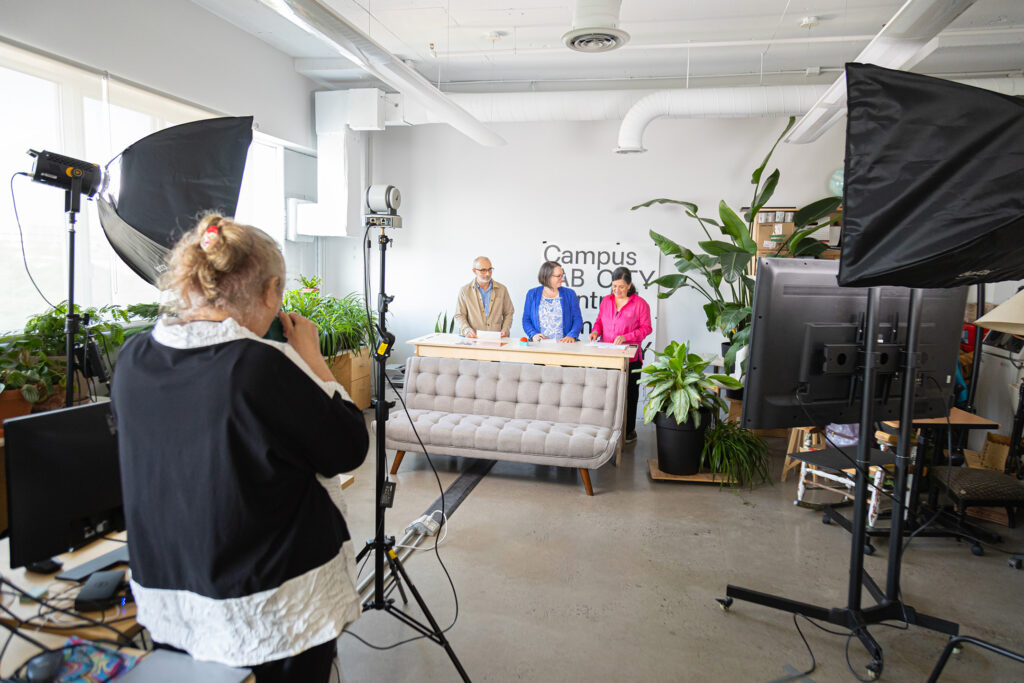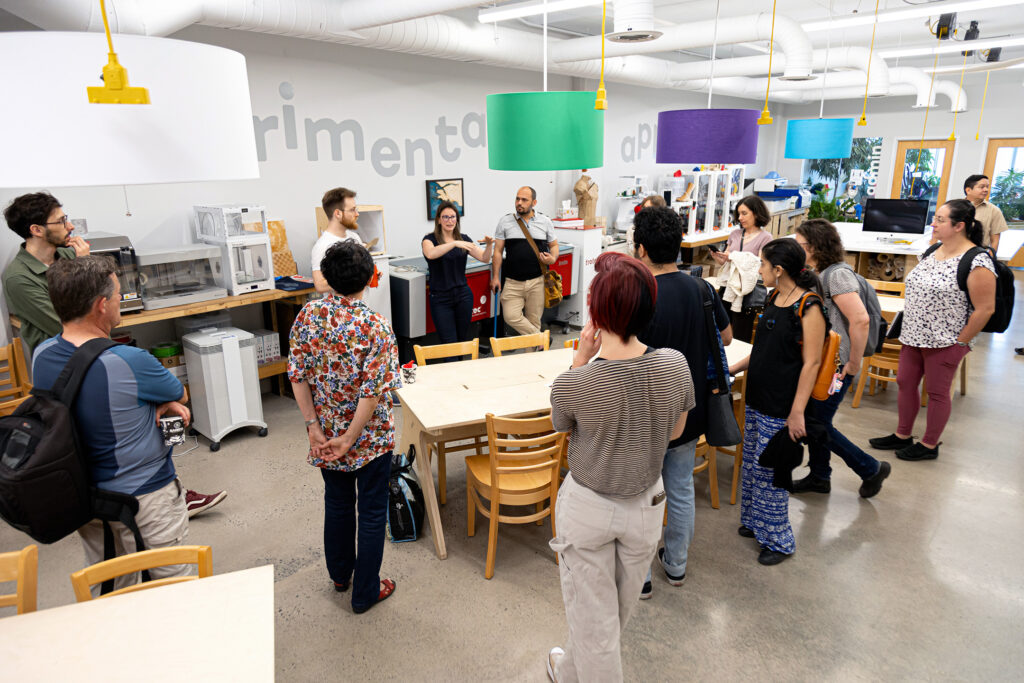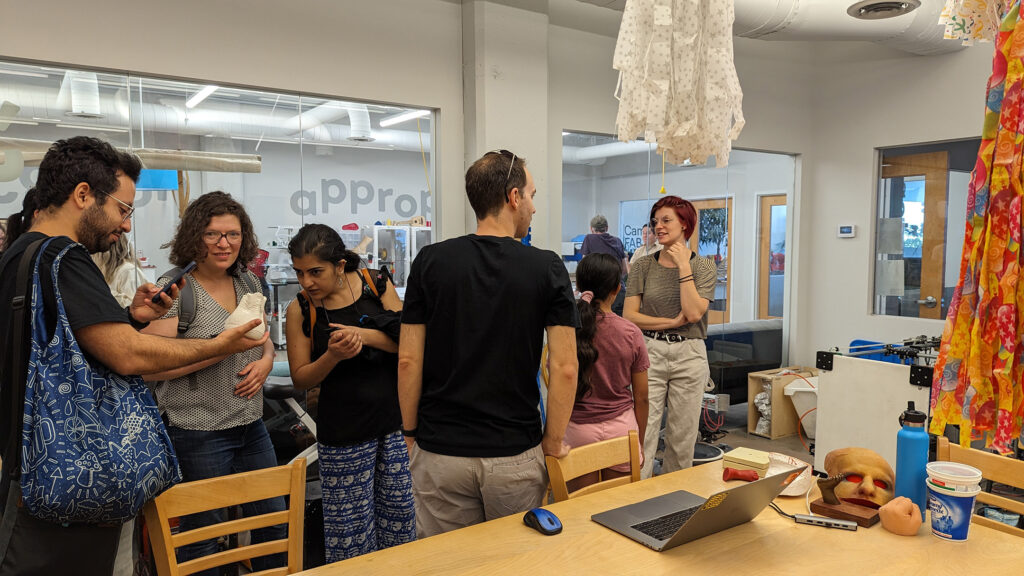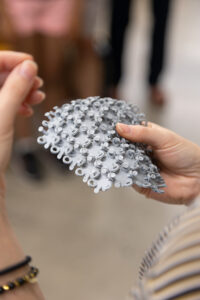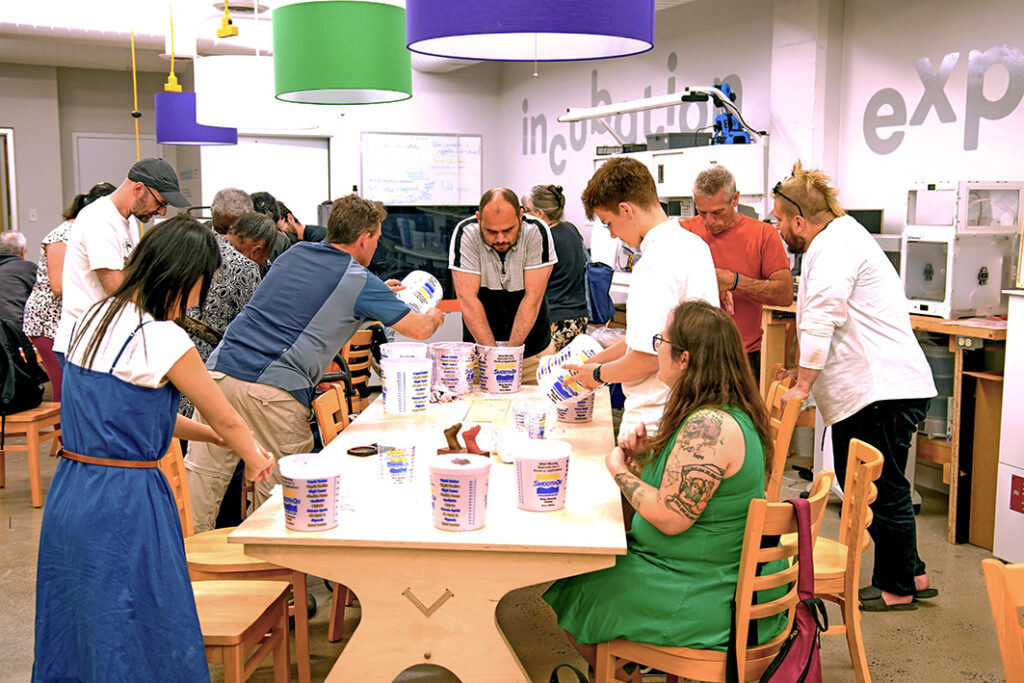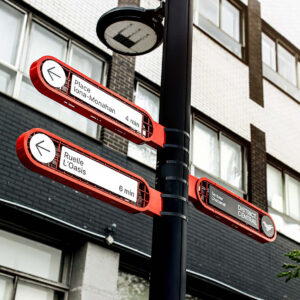NEWS FROM RIGHT HERE
August 16, 2023
Communautique Conjures up a Fab City in District Central
A key player in the heart of the District Central, Communautique builds on the concept of Fab City to create connections between local businesses for the purposes of mutualization and citizen participation. Its actions are in line with the vision of the SDC District Central, with whom it works closely to encourage networking and the development of a truly collaborative network. Founded in the late 90s, this unusual business played a pioneering role, founding Echofab – Canada’s first Fab Lab – and actively promotes the Fab City and Living Lab movements in Quebec. Under the leadership of Monique Chartrand, her team moved to Louvain Street in 2019, ready to seize the momentum of revitalization that is sweeping through the District Central.
In order to contribute to the transformation of the territory based on the principles of sustainable development, Communautique is actively pursuing its efforts to deploy the concept of a local mini factory. This can take the form of a conventional manufacturing site, open to new ideas and people or be virtually articulated between the facilities of organizations sharing a common culture and objectives. This mutualization initiative makes Communautique a natural partner for the SDC District Central’s Connector of Opportunities program.
Beyond its own facilities, Communautique’s efforts are focused on creating a community of businesses and citizens who will embody Fab Lab principles throughout the District Central, and even the City of Montreal. The socially innovative organization played a key role in the city’s accession to the international Fab City network. Today, more than 2500 Fab Labs are active in over 130 countries. This fast-growing international ecosystem is transforming the economy by democratizing local, human-scale manufacturing.
Innovation and mutualization in action
When the pandemic hit in 2020, the supply of protective visors for the healthcare sector became a fundamental challenge. For Communautique, it was the perfect opportunity to demonstrate its unique prototyping capabilities, as well as the advantages of its distributed design and production model. Working with Sacré-Coeur Hospital’s Medical Committee, the team tackled the challenge of creating a product that was not only comfortable and efficient, but also reusable and recyclable. Faced with this technical challenge, Communautique was able to draw on its expertise in eco-design and biomaterials to quickly find a solution. “Our Fab Lab DNA and pooling reflexes enabled us to respond at high speed. With the collaboration of several partners, including local company Tak Design for ergonomics, we were able to create a high-performance model in just three days,” emphasizes Monique Chartrand.
There were so many constraints at play here. The search for the ideal plastic was one of the trickiest problems to solve, all the more when trying to avoid making yet another disposable product in the context of the pandemic. In the wake of its collaborative process, the company was finally able to launch high-volume production. The business succeeded in supplying over 35,000 visors for distribution in the healthcare system, a total rivaling those of the major companies called on to help at the same time. This success demonstrates the potential associated with the principles of mutualization and open innovation advocated by Communautique’s Echofab. Flexibility and reaction time are undeniable advantages of this approach, which aims to bring manufacturing back to the heart of our cities and neighborhoods.
Given its unique ability to adapt, Echofab is able to meet the diverse needs of local businesses. In another example of pooling expertise and resources, Communautique’s Fab Lab collaborated with electronics company Nanogrande to carry out high-precision printing of printed circuits, once again drawing on its prototyping expertise.
“Supply chain problems in the wake of the pandemic were a stark reminder of the need to regain control of our production methods. A lot of local know-how was lost with the outsourcing of our manufacturing sectors,” adds Monique Chartrand. Made possible by the emergence of new technological solutions, the distributed production approach of Fab Labs suggests a paradigm shift destined to revolutionize our businesses.
Citizen participation at the heart of the process
In the spirit of open innovation, citizens must participate in the design and creation of products intended for them. After all, users are in the best position to recognize their own needs and to ensure that the solutions we propose really do suit them. This idea guided Communautique in its Remix ta chaise project (see the documentary here), also deployed in the District Central. As part of this initiative, local artists were invited to create works of art from chairs collected in the neighborhood and these unique pieces were then auctioned off to help finance the second phase of the project. This new phase involved creating prototypes of public benches inspired by the culture and personality of the neighborhood, all in collaboration with various partners including local company, Bois Urbain. Ultimately, we hope to be able to 3D print these benches, so that they can be produced virtually wherever they are to be installed. Rather than being uniform in design, these benches will form a “family” of products with features that reflect a common territory.
Campus Fab City: A springboard event
On June 15 and 16, Communautique and the SDC District Central hosted Campus Fab City, an event combining open-houses at Fab Lab installations and virtual conferences, attended by some 2,000 key players in the international Fab City and sustainable development network. This interactive happening proved a resounding success, enabling numerous businesses in the area to discover the Fab Lab concept, the full potential of mutualization, and innovative social economy approaches. Events like this are likely to be held more frequently, strengthening the bonds and sense of community that will enable District Central to fully realize its promise, while inspiring other SDCs across Quebec to follow suit.
Prototyping the neighbourhood
One of Communautique Fab Lab’s most valuable areas of expertise is its ability to develop prototypes quickly and efficiently. With the exodus of the manufacturing sector, this know-how has all but disappeared in Quebec, as our educational institutions and companies have focused more on design than realization. For Monique Chartrand and her team, however, the most important prototyping project is the neighborhood itself. By mobilizing forces around common goals and developing the area into a humane and enriching place to live, these visionaries are laying the foundations for a large-scale Fab Lab, reflecting a future where the economy, the environment and the people will be in perfect harmony.
A District Dedicated to Quebec’s Economic Self-Reliance
District Central is 25 million square feet. Photo credit: Branden Desormeau Pandemic, inflation, trade wars with the United States… every time a crisis breeds economic uncertainty, the importance of local…
Read MoreThe Challenges and Requirements of an Ambitious Transformation Process
In recent years, District Central has successfully attracted a wide range of businesses. Its many strengths even earned it the designation of “Metropolitan Innovation Zone” in 2021. Driven by the…
Read MorePublic and Private in Symbiosis: A Partnership with Vision
Buildings that characterise Chabanel West in District Central ©Branden Desormeau District Central is a thriving business district in the heart of the Ahuntsic-Cartierville borough. As a Société de développement commercial…
Read More
